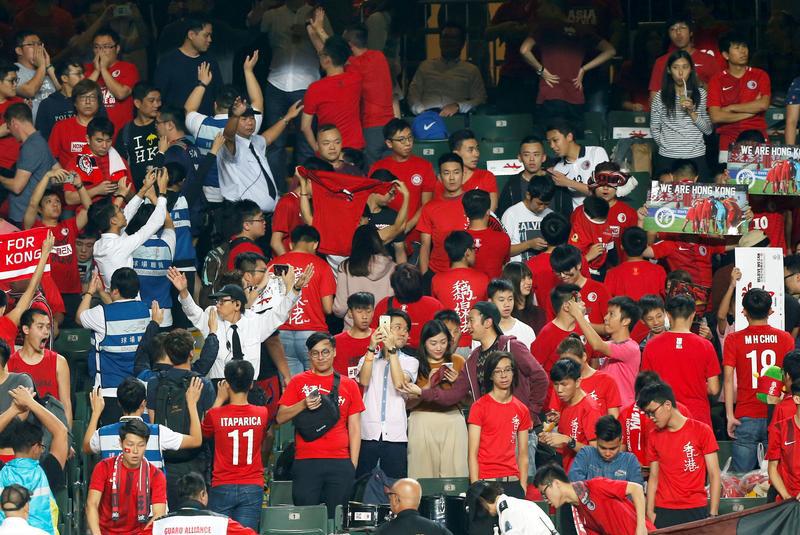Insult China's National Anthem at Your Peril
| Publisher | Human Rights Watch |
| Publication Date | 19 March 2018 |
| Cite as | Human Rights Watch, Insult China's National Anthem at Your Peril, 19 March 2018, available at: https://www.refworld.org/docid/5b39f1f2a.html [accessed 22 May 2023] |
| Disclaimer | This is not a UNHCR publication. UNHCR is not responsible for, nor does it necessarily endorse, its content. Any views expressed are solely those of the author or publisher and do not necessarily reflect those of UNHCR, the United Nations or its Member States. |
Proposed Law Could Land Hong Kong People in Prison
March 19, 2018 8:00PM EDT Dispatches
Maya Wang, China Senior Researcher
 Security guards wave to urge Hong Kong fans stop booing and turning their backs during Chinese national anthem, at the Asian Cup preliminary match between Hong Kong and Lebanon in Hong Kong, China November 14, 2017. © 2017 Reuters
Security guards wave to urge Hong Kong fans stop booing and turning their backs during Chinese national anthem, at the Asian Cup preliminary match between Hong Kong and Lebanon in Hong Kong, China November 14, 2017. © 2017 Reuters
Hong Kong people have seen their right to free expression increasingly threatened under Chinese Communist Party rule, but soon they are likely to have even more to worry about. This week Hong Kong's Legislative Council, or LegCo, will officially kick off discussion on a proposed law that could criminally punish – with up to three years in prison – anyone who "insults" the Chinese national anthem, "March of the Volunteers."
If enacted, the bill will penalize anyone who "performs or sings" the anthem "in a distorted or derogatory manner," or "publicly and willfully alters the lyrics or the score." Schools will be required to teach students to sing and "understand the history and spirit" of the national anthem.
But what would constitute an "insult" to the song? Unnamed government sources say it will depend on the person's "intent," encouraging political interpretations by the authorities.
As with other vague bans on free speech, discussions about what is allowed have quickly brought out the absurdity of the bill. One Hong Kong newspaper tried to clarify the bill by positing different scenarios in a "question and answer" format: in one, the paper asks whether people at a restaurant could face prosecution if they fail to stand when the anthem is played on television. Citing "official sources," the paper reassures those who do not stand because they are eating, but suggests that other gestures – such as flipping a middle finger – might not earn similar leniency.
International human rights law permits restrictions on speech to protect national security or public order, but only when absolutely necessary and strictly proportionate to the risk of harm to those interests. The proposed law does not meet this requirement and would violate such rights guaranteed under Hong Kong's functional constitution, the Basic Law.
Hong Kong Chief Executive Carrie Lam has played down fears the bill could be politicized, saying it merely aims to encourage "respect" for the anthem. Yet she has not acknowledged citizens' concerns about forcing their political loyalty to Beijing, or how mainland authorities' frequently jail people for peaceful criticism. Enacting this law will merely remind Hong Kong people just how tenuous their rights to free speech are.
Link to original story on HRW website

